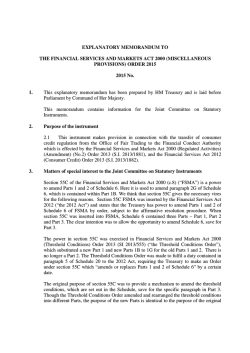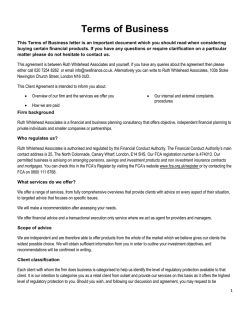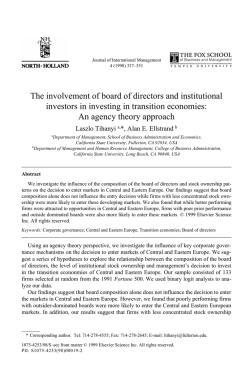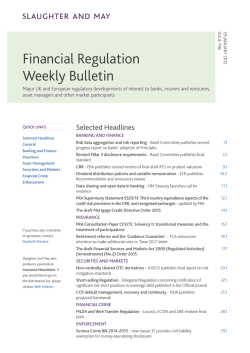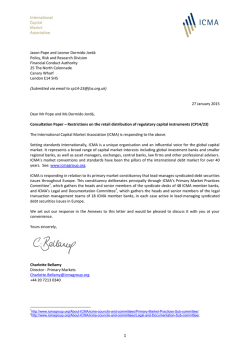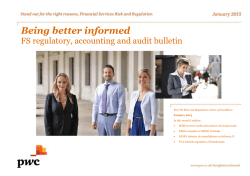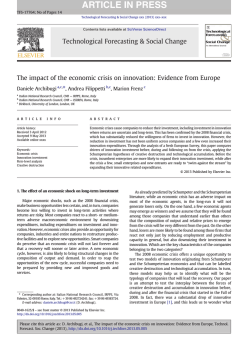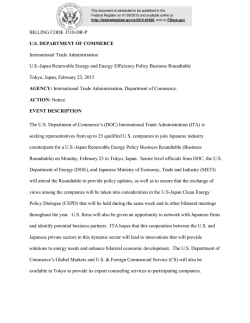
Data bulletin: Issue 2 (January 2015)
Financial Conduct Authority Data Bulletin January 2015 Issue 2 In this issue page 14 page 07 page 02 Introduction from the editor page 04 Approved persons page 11 Policy initiatives with data implications Spotlight on authorisations page 10 Financial promotions Useful links page 13 FCA events Introduction from the editor We published our first Data Bulletin in October 2014 and we were pleased to receive a lot of positive feedback and requests to subscribe to the bulletin. We are glad you liked it. Nick Cook Head of Data & Analysis In this edition, among other things, we highlight some areas of the authorisations process, including interesting statistics on the individuals we approve, and how we manage complaints about advertising in financial services. These Data Bulletins are designed for you, so we want to continue to hear from you about what you would find useful. Please email your feedback to us at: [email protected] I would also like to draw your attention to our recent publication about our progress in implementing the FCA’s Data Strategy. A short summary video is available at: fca.org.uk/data-strategy. Kind regards, Nick Cook Head of Data & Analysis Contents Spotlight on authorisations – Key performance indicators and service standards 4 – Consumer credit authorisations 5 – Project Innovate 6 Individuals we regulate 2 Issue 2 – January 2015 4 7 Financial promotions 10 Policy initiatives with data reporting implications 11 FCA Events 13 Useful links 14 Introduction from the editor Data Bulletin What we will cover in this issue Our Data Bulletin gives us the opportunity to highlight some of the information we hold, which we believe will be of interest to you. Here is a brief summary of what we will be covering in this edition. Spotlight on authorisations Financial promotions The authorisations process is an important area for us as a conduct regulator and we have key performance indicators and service standards that we measure ourselves against. Page 4 provides a brief summary on our authorisation key performance indicators and where you can find out more information about how we are performing. We regularly receive complaints concerning advertising within financial services. Page 10 provides information on how we manage these complaints and the actions we have taken. With our authorisation responsibilities extended to consumer credit firms as of 1 April 2014, in this issue of the Data Bulletin we will look at the types of firms that will be seeking authorisation. Some of the new policies we implement have data reporting implications for the firms we regulate. On page 11 we provide some information on the key stages within this process and the timeline for some of the key policy initiatives. We will also look at how we are dealing with new and innovative firms and how we are supporting them through the authorisation process as part of our Project Innovate work. Approved persons In the first edition, we provided some statistics on the firms we regulate. In this edition we focus on approved persons and their role within authorised firms on page 7. 3 Issue 2 – January 2015 Policy initiatives FCA events As part of our commitment to engaging with as many of our firms as possible, we hold a number of events across the UK. Page 13 provides some data on past events and a look forward at upcoming FCA events. Spotlight on authorisations Key performance indicators and service standards Average processing time (APT)* We publish two complementary sets of performance information to provide transparency about the authorisations process. The APT is the processing time on average over a specific time period; from the time we receive the application to the time we determine it. It includes the time that has elapsed whilst we wait for the necessary information from the applicant. In the last quarter of 2014: Firstly, we report against our statutory commitments twice a year, showing performance against timescales for decisions set out in Financial Services and Market Act (FSMA). While we make every effort to determine applications within these target timescales, it is vital that we make the right regulatory decisions and sometimes this will mean that application decisions may take longer. • The APT for retail firm type applications has increased slightly. • The APT for wholesale firm type applications continues to reduce. Secondly, we also provide key performance indicators (KPIs) that show the average length of time it takes for us to process applications, and the proportion of applications that are approved. • The APT for Alternative Investment Fund Manager (AIFM) application types remains broadly stable, although the APT for ‘small auth’ AIFMs has reduced significantly in this time. Average time to be determined** (weeks) We publish our KPIs on a quarterly basis. Below is an extract from our latest authorisation KPIs that will be available on our website from 30 January 2015. If you would like to understand more about how we define firms please refer to the Data Bulletin underlying data pack. If you want to find out more about the average processing time, the volume of applications we receive and the distribution of application decisions, please see the latest authorisation key performance indicators, which are available on our website from 30 January 2015. You can also find out more by looking at the most recent publication of organisation service standards on our website. 40 35 30 25 20 15 10 5 0 Retail Wholesale Jan − Mar 14 Small Auth AIFM Apr − Jun 14 Small Reg AIFM Jul − Sep 14 Full Scope AIFM Oct − Dec 14 Data as at 31 December 2014 *Authorisation: To process a solo-regulated firm application for a Part IVA permission **’Determined’ is the earliest of when the application is made ‘subject to’ or authorised. ’Subject to’ is a point in time where the FCA makes a decision to authorise, but with conditions to be met before authorisation can be confirmed. This includes applications that may subsequently be withdrawn, having not met the necessary conditions or where the application was subsequently retracted. 4 Issue 2 – January 2015 Authorisations Data Bulletin Consumer credit authorisations Since 1 April 2014 we have been responsible for regulating consumer credit in the UK, so if firms want to provide consumer credit services they need to be authorised by us. Nearly 50,000 consumer credit firms who had a Consumer Credit Licence with the Office of Fair Trading (OFT) registered with us for interim permission. All of those firms will need to apply for authorisation, and we have started a staged process of asking them to apply which will continue until 2016. We analysed how best to manage this process, by looking at the firms regulated by OFT, and how they are broken down by sector. Each firm must apply for authorisation in a specified application period before March 2016, with interim permissions continuing until we have determined the outcome of the authorisation application. We intend to publish more detail around how the consumer credit authorisations process has been going in due course. By interim permissions type By business type Firms can hold more than one interim permission. The table below breaks down firms based on the highest risk interim permission they hold. Risk refers to the risk of consumer detriment. For example, 1% are grouped within high-cost short-term credit as this is the highest risk interim permission they hold. The figure below shows the split of consumer credit firms that were granted interim permission, by business line. This highlights the diverse and broad spectrum of firms now under our remit. Number of firms Percentage 11,019 22% Broker – other types 9,236 19% Commercial debt counselling 7,237 15% Limited permission credit broker 6,516 13% Broker – home finance 2,661 5% Debt Collection 1,036 2% Home collected credit 822 2% High-cost short-term credit 526 1% 71 1% Other 10,139 20% Total 49,463 Commercial debt adjusting 20% Motor 18% IFA 10% Mortgage-related 6% Insurance 5% Construction 4% Ancillary credit 4% Medical 2% Professional services Logbook lending Data as at 1 April 2014 To understand more about how we classify consumer credit firms please refer to the Data Bulletin underlying data pack. 2% Estate agents/letting 2% Furniture 2% Industrial goods 2% Sports facilities/Health clubs 24% Other This includes interim permission firms with less than 1% each (firm types in this category include credit union, debt collecting and pawnbroking) Data as at 1 October 2014 Please note figures may not add up to 100% due to rounding 5 Issue 2 – January 2015 Project Innovate As part of Project Innovate, we launched our Innovation Hub on 28 October 2014. The Innovation Hub helps businesses who are developing innovative approaches that can benefit consumers in financial services markets. A firm does not have to be regulated by the FCA to receive support from the Innovation Hub. We want to foster innovation in the industry to genuinely improve the lives of consumers. The Innovation Hub helps innovator businesses to understand the regulatory framework, how it applies to them and, in some cases, how to prepare an application for authorisation. We also offer them a dedicated contact for up to a year after they have been authorised. In the first two months we received 83 requests for support. We have so far offered support to 58% of these requests. Where this support has been completed, 61% have been provided with an informal steer to help guide their decision-making. This is different from formal guidance – businesses rely on what we tell them at their own risk, but it means we can share our thinking a lot more quickly. We have resolved other enquiries and given businesses direction towards useful documents, as well as ongoing support in preparing their application for authorisation. Feedback from businesses has been positive so far, with 86% of respondents agreeing that their overall experience with the Innovation Hub has been good or excellent. The figures are similar for the effectiveness of our communications, the promptness of our response and our ability to understand the need for support. Through our engagement with a wide range of stakeholders, we are also looking to understand where our regulatory framework may need to adapt in the future. We will provide regular updates on our progress in fostering innovation, including continuing to provide more information in the Data Bulletin and our Annual Report. If you would like to find out more about Project Innovate please visit our website. Innovation Hub live since October 2014 58% Offered support 61% 83 Of those offered support were given an informal steer Requests for support Innovation Hub 91% 86% Rated the promptness of our response as good or excellent Felt they had a good or excellent experience Data as at 31 December 2014 6 Issue 2 – January 2015 Approved persons Overview of controlled functions For firms to carry out specific financial services activities they must have people that are approved by us to carry out certain roles within the firm, what we define as controlled functions. Different types of firms need approved persons with different controlled functions. Below we outline the main controlled function groups: • A customer function is for those who deal with customers, particularly in an advisory capacity. For example – financial advisers, traders and investment managers. • A significant influence function is for those who exert considerable influence on the conduct of the authorised firm’s regulatory activities. For example – directors and heads of compliance. • A LIBOR function is for those who monitor and carry out surveillance of LIBOR submissions at panel banks and at the benchmark administrator (currently Intercontinental Exchange). There are 150,229 approved persons who hold 240,580 controlled functions between them. An approved person can have more than one controlled function at more than one firm. Number of controlled functions by firm type Number of positions by controlled function 125,000 60,000 50,000 100,000 40,000 75,000 30,000 50,000 20,000 25,000 10,000 0 Libor functions 7 Cu s CF tom CF CF 1 er 11 10 D C ir M on om CF ect or pl ey ia 4 P L n ar CF aun ce tn 2 de Ov er No e r n ing rsig Ex Re ht e p CF c 29 CF utiv orti n e 3 Si gn Ch Dir g CF CF CF ific ief ect 5 a nt Exe or Di 8 A 28 re ct ppo Sys ma cuti n te or v r of tion ms age e m a Un m en en nd in t c t co rp and ont r or at Ov ols ed er As sigh CF so t 6 C CF Sm F1 ciat 2 i 4 CF 0 B all F Ac on 50 tu en rie Be ch ndl aria nc ma y S l hm rk oc ie s ar k ubm ty ad m issio in ist n ra tio n CF 30 s rm l fi ur er Pr of es sio na In s ke r) es sin Bu e ag tg M or Customer functions e ta sit po de n- no s( ur In s al er en G Significant influence functions Lif ur er y In s ed ia r th an rit ce O In te er rm O th er re s ty Fu ie s& g in ild cu Se Bu d Ba nk an tu cie en So em ag M an en t m st In ve Pe rs on al In v es t m en t t 0 Please note that individuals can hold multiple approvals and can work for multiple firms at once – the numbers shown are the numbers of approvals, not the number of people who have approvals Data as at 13 January 2015 Issue 2 – January 2015 Approved persons Data Bulletin Approved persons By gender 18% 82% Female Male Controlled function By group Customer functions 122,998 LIBOR functions 25 Significant influence functions 117,557 8 Issue 2 – January 2015 £ Data on approved persons We are often asked to provide a breakdown of how approved person numbers have changed and how controlled functions are distributed. Below you can see the trend in approved persons and the demographics of this population. As you can see from the chart below, the number of approved persons has been falling gradually up until 2014. Over 29,000 approved persons in the UK are approved to perform more than one type of controlled function. The largest controlled function population is the customer function (CF30), which is necessary for those dealing with customers, whether they are retail or wholesale. 28% of approved persons with CF30 controlled functions are approved to perform this function at banks and building societies. Approved person by number of controlled functions held* Trend in number of approved persons 125,000 200,000 161,159 159,905 157,082 150,000 150,483 148,383 150,229 120,247 100,000 75,000 100,000 50,000 50,000 0 25,000 Jan 2010 Jan 2011 Jan 2012 Jan 2013 Jan 2014 0 13 Jan 2015 17,571 1 2 5,727 5,372 3 4 *Please note individuals with the same controlled function position at more than one firm are only counted once. Data as at 13 January 2015 Approved persons Demographics 43 42 Thousands 31 Age of approved 9 persons male female 20 8 4 18-25 26-35 Issue 2 – January 2015 36-45 1,312 5 or more 46-55 56-65 66+ Note: the average age of an approved person is 45 Financial promotions Complaints about advertising in financial services We periodically review financial promotions across various media and across all regulated financial services sectors, to assess whether they are fair, clear and not misleading. We reviewed 3,604 promotions in detail between 1 July and 31 December 2014. We review promotions through different sources and we encourage firms, consumers and other regulators to report unfair, unclear or misleading promotions to us. We received 467 complaints through our Hotline mailbox [[email protected]] between 1 July and 31 December: • 303 complaints from consumers • 45 complaints from firms 181 cases resulted in one or more promotions being amended or withdrawn through our interaction with firms • 119 referrals from other regulators If we find that a financial promotion is not complying with our rules, then whether we take action, and the severity of that action, depends on the risk it poses to consumers. If we decide the financial promotion poses a significant risk to consumers we can ask the firm to withdraw or amend it. Between 1 July and 31 December 2014, 181 cases resulted in one or more promotions being amended or withdrawn through our interaction with firms. We can also take supervisory action or refer the promotion/advertisement to other regulators – such as the Advertising Standards Authority (ASA) – and we have the power to ban financial promotions or take enforcement action against a firm. You can find out more about how we handle misleading financial promotions here. You can complain about a financial promotion by visiting our website whether you are a firm or a consumer. Cases resulting in an amend/withdraw outcome by sector Consumer credit Investments General insurance 70% 23% 4% Banking Mortgages Pensions 2% 1% 1% Please note this relates to the 181 cases actioned between 1 July and 31 December 2014. Figures may not add up to 100% due to rounding. Data as at 31 December 2014 10 Issue 2 – January 2015 Financial promotions Data Bulletin Policy initiatives with data reporting implications New data we are collecting Last year we implemented a number of new policies, some of which require firms to send us additional data. These developments have been driven by a mixture of both UK and European initiatives, including the Mortgage Market Review (MMR), the Capital Requirements Directive IV (CRD IV) and the Alternative Investment Fund Managers Directive (AIFMD). Policy goes through a number of stages before rules are made and (if applicable) data reporting starts. Below we outline the key stages that will typically apply. Reporting starts Rules made by FCA Board Co ns pe ult rio ati d on Ru l FC es m A a Bo de ar b d y Re Under the Financial Services and Markets Act 2000 (FSMA) we are required to consult with firms on all new policy and changes to existing rules and guidance. We publish consultation papers, allowing the industry and other stakeholders a right of reply and a chance to review proposed policy changes. p st ort ar in ts g Consultation period The FCA Board is the only body that can make rules for the FCA. Where policy involves reporting requirements, the Board approves the proposals as part of the rule-making process. Once approved, the new rules are published in the FCA Handbook at the appropriate date. This is the earliest date that new data reporting starts under the policy initiative. The length of time after a rule is made by the FCA Board and the start of when a firm must report to us often depends on the complexity of the new data reporting. With more complex data item amendments or additions firms require longer to get ready for the new policy initiative. 11 Issue 2 – January 2015 Policy initiatives with data implications Data Bulletin Consultation papers 32 consultation papers were published in 2014 6 of these consultation papers had data reporting implications This led to changes in 12 data item reporting forms Improving complaints handling We are currently consulting on improving complaints handling. We want to ensure that the process of complaining is straightforward, transparent and fair to consumers, while allowing firms to handle complaints as efficiently as possible, and for consumers to have effective access to the ombudsman service if they remain dissatisfied. This consultation paper sets out proposals to improve the reporting and publication of complaints. If approved, all complaints made to firms will be made reportable, not just those closed after the next business day. In addition, firms will be expected to report data that could help us to contextualise the number of complaints they receive. This will enable us to monitor and publish the number of complaints compared to the relative size of each firm (number of accounts/number of sales) to provide greater context and a better comparison between firms. We are asking for comments on this consultation by 13 March 2015. What’s coming up To find out more about the consultations currently open please visit our website. Anyone can respond to any of our consultations. 12 Issue 2 – January 2015 FCA events As part of our commitment to engaging with as many firms as possible we hold a number of events across the year, including workshops, conferences and briefings. These graphics illustrate the regional spread of our events and other major events we have attended in 2014, as well as the number of firms that we met in these areas. In 2015 we will continue to hold a wide range of events across the UK. These will include our Positive Compliance workshops, which run until March, focusing on Retail Distribution Review (RDR) and Centralised Investment Propositions. These workshops are an opportunity for firms to hear directly from us and to discuss examples of good practice with us and their peers. To find out more about our events, please visit our website. nd la e Ir 119 568 02 firms attended East 14 regional events 884 firms attended 10 regional events regional events 628 firms attended 06 regional events 01 regional events The FCA held 2905 firms attended 155 32 56 events across the UK firms attended regional events 522 firms attended regional events 993 06 firms attended regional events 16 395 rt No 04 623 Ea st firms attended 10 regional events Wale s Issue 2 – January 2015 703 firms attended 15 regional events 912 firms attended nds Midla regional events firms attended es t regional events h S o u t h Wes t est th W Nor 15 13 don Lon Isle of Man firms attended So ut h st Ea No rth er n land Scot W Data as at 31 December 2014 FCA events Data Bulletin Next steps In future issues we want to make sure we give you the information that you would find most useful, so if you have any comments or suggestions for future content please contact us at: Useful links Latest available data External links Bank of England statistics [email protected] FCA links Authorisations KPIs/service standards (30/01/2015) Get the facts If you would like to subscribe/ unsubscribe from the Data Bulletin please visit: Organisation service standards fca.org.uk/your-fca/documents/data-bulletin/form Project Innovate Consumer Credit Authorisations – quick guide Financial promotions Financial promotions guidance FCA consultation papers FCA Events FCA data strategy Mortgage lending statistics Interest Rate hedging products compensation Data Bulletin Underlying data used in this bulletin 14 Issue 2 – January 2015 Financial Conduct Authority www.fca.org.uk/your-fca/data-bulletin/data-bulletin-issue-2 © Financial Conduct Authority 2015 25 The North Colonnade Canary Wharf London E14 5HS Telephone: +44 (0)20 7066 1000 Website: www.fca.org.uk All rights reserved
© Copyright 2026

